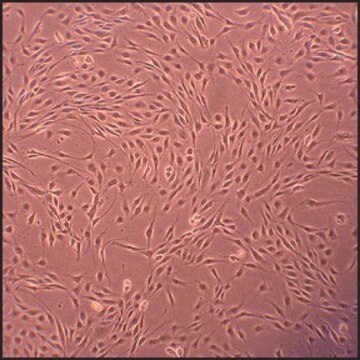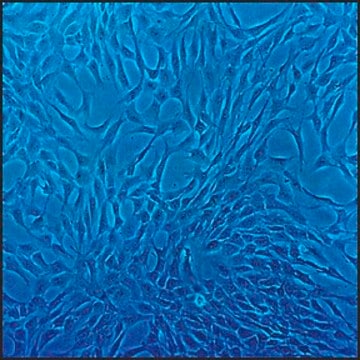CN402-05
Canine Chondrocytes: CnC (Cryovial)
Iniciar sesiónpara Ver la Fijación de precios por contrato y de la organización
About This Item
UNSPSC Code:
41106514
NACRES:
NA.81
Productos recomendados
biological source
canine articular cartilage (normal)
packaging
pkg of 500,000 cells
manufacturer/tradename
Cell Applications, Inc
growth mode
Adherent
karyotype
2n = 78
morphology
chondrocyte
technique(s)
cell culture | mammalian: suitable
relevant disease(s)
arthritis
shipped in
dry ice
storage temp.
−196°C
General description
Lot specific orders are not able to be placed through the web. Contact your local sales rep for more details.
Canine Chondrocytes (CnC) are derived from normal canine articular cartilage where they produce and maintain the extracellular matrix of cartilage. Following monolayer culturing, CnC can be grown in alginate microspheres to study chondrocyte proliferation and metabolism in a three-dimensional in vitro system. Alginate microspheres provide more physiological conditions for the chondrocytes and allow them to sustain normal proteoglycans production and retention. Because of the prevalence of degenerative joint disease in geriatric dogs, CnC can be a useful tool for veterinary practice.
Canine Chondrocytes (CnC) were utilized to evaluate anti-inflammatory and anti-oxidant activity of Glyco-Flex III (Yáñez, 2008) and trans-pterostilbene (Remsberg, 2008). They were also used in material studies aimed to develop optimal surfaces/scaffolds for engineered tissues, cellular arrays, biosensors and lab-on-chip devices (Wright, 2012; Shaik 2013a,b).
Canine Chondrocytes (CnC) are derived from normal canine articular cartilage where they produce and maintain the extracellular matrix of cartilage. Following monolayer culturing, CnC can be grown in alginate microspheres to study chondrocyte proliferation and metabolism in a three-dimensional in vitro system. Alginate microspheres provide more physiological conditions for the chondrocytes and allow them to sustain normal proteoglycans production and retention. Because of the prevalence of degenerative joint disease in geriatric dogs, CnC can be a useful tool for veterinary practice.
Canine Chondrocytes (CnC) were utilized to evaluate anti-inflammatory and anti-oxidant activity of Glyco-Flex III (Yáñez, 2008) and trans-pterostilbene (Remsberg, 2008). They were also used in material studies aimed to develop optimal surfaces/scaffolds for engineered tissues, cellular arrays, biosensors and lab-on-chip devices (Wright, 2012; Shaik 2013a,b).
Cell Line Origin
Cartilage
Application
production and maintenance of extracellular matrix, cartilage, collagen, differentiation and de-differentiation, signal transduction, apoptosis, differentiation, drug screening, gene expression, cytokine production, agarose assays, chondrocyte adhesion to medical implants, scaffolds for cartilage regeneration
Components
Canine Chondryocyte Basal Medium containing 10% FBS & 10% DMSO
Preparation Note
- 1st passage, >500,000 cells in Canine Chondryocyte Basal Medium containing 10% FBS & 10% DMSO
- Can be cultured at least 10 doublings
Subculture Routine
Please refer to the CnC Culture Protocol.
Storage Class
11 - Combustible Solids
wgk_germany
WGK 3
flash_point_f
Not applicable
flash_point_c
Not applicable
Certificados de análisis (COA)
Busque Certificados de análisis (COA) introduciendo el número de lote del producto. Los números de lote se encuentran en la etiqueta del producto después de las palabras «Lot» o «Batch»
¿Ya tiene este producto?
Encuentre la documentación para los productos que ha comprado recientemente en la Biblioteca de documentos.
Nuestro equipo de científicos tiene experiencia en todas las áreas de investigación: Ciencias de la vida, Ciencia de los materiales, Síntesis química, Cromatografía, Analítica y muchas otras.
Póngase en contacto con el Servicio técnico







